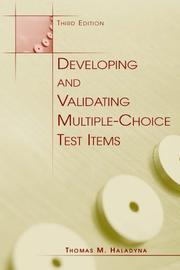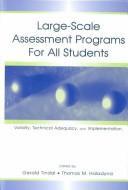| Listing 1 - 10 of 109 | << page >> |
Sort by
|
Book
ISBN: 1617352691 9781617352690 9781607522270 1607522276 9781607522287 1607522284 Year: 2009 Publisher: Charlotte, NC Information Age Pub.
Abstract | Keywords | Export | Availability | Bookmark
 Loading...
Loading...Choose an application
- Reference Manager
- EndNote
- RefWorks (Direct export to RefWorks)
Examinations --- Test results --- Test validity --- Validity of examinations --- Validity. --- Interpretation
Book
ISBN: 1412363209 Year: 2008 Publisher: Chicoutimi : J.-M. Tremblay,
Abstract | Keywords | Export | Availability | Bookmark
 Loading...
Loading...Choose an application
- Reference Manager
- EndNote
- RefWorks (Direct export to RefWorks)
Book
ISBN: 150990428X Year: 2018 Publisher: OXford, UK : Hart Publishing,
Abstract | Keywords | Export | Availability | Bookmark
 Loading...
Loading...Choose an application
- Reference Manager
- EndNote
- RefWorks (Direct export to RefWorks)
"Legal reasoning settles morally pressing matters through a technique that largely bypasses open-ended moral argument. That technique makes central what certain persons validly decided in the past, for example in creating statutes, judicial resolutions, contracts, or wills. Identifying valid decisions is a lawyerly skill and, echoing legal practice, legal philosophy has paid considerable attention to validity criteria. But it has neglected to explore validity's point: whether, and if so exactly how, the special technique of validity contributes to a legal system's ability to realise justice and human rights. Even the most sensible defences of the moral need for positive law have insufficiently probed this key step in the argument. This book lays bare the workings of legal validity, and shows why, and within what general limits, this technique equips legal systems with privileged tools to foster human well-being. In so doing, the book explains how power-conferring norms setting out validity criteria endow agents' intentions with 'performative' effect ('I hereby.') and can secure the requirement of justice that there be widespread convergence on specific patterns of conduct shaped through a cooperative effort. Legal meaning is accordingly systemic, resulting from the valid acts of multiple agents whose decisions can, by virtue of exercising legal power, also exercise moral power (authority). In short, the book articulates why it is morally necessary that validity does not primarily turn on moral considerations"--
Book
ISBN: 3428586603 3428186605 Year: 2022 Publisher: Berlin : Duncker & Humblot,
Abstract | Keywords | Export | Availability | Bookmark
 Loading...
Loading...Choose an application
- Reference Manager
- EndNote
- RefWorks (Direct export to RefWorks)
Book
ISBN: 1681238950 9781681238951 9781681238937 9781681238944 Year: 2017 Publisher: Charlotte, NC
Abstract | Keywords | Export | Availability | Bookmark
 Loading...
Loading...Choose an application
- Reference Manager
- EndNote
- RefWorks (Direct export to RefWorks)
Test bias. --- Examinations --- Test results --- Test validity --- Validity of examinations --- Bias in tests --- Prejudice in testing --- Discrimination in education --- Educational tests and measurements --- Validity. --- Interpretation --- Validity --- Test fairness
Book
ISBN: 147256071X 1282719726 9786612719721 1847315682 9781847315687 9781472560711 9781849460057 1849460051 Year: 2010 Publisher: Oxford Portland, Or. Hart
Abstract | Keywords | Export | Availability | Bookmark
 Loading...
Loading...Choose an application
- Reference Manager
- EndNote
- RefWorks (Direct export to RefWorks)
This book examines the law developed by the EU to control cartels. The law, including case-law, is carefully documented and analysed against a standard oflegitimacy which questions the EU's enforcement measures, its institutional structures, policy choices, substantive law, evidentiary standards and procedures and sanctions. It includes a unique catalogue of over 150 EU cartel decisions, as well as novel analyses of difficult borderline issues such as mixed horizontal and vertical cartels, single-brand dealer cartels and buyer cartels. The effect on trade in cartel cases is analysed with refer

ISBN: 0429238525 1136790659 1283845202 1136790667 0203825942 1410610594 9781410610591 9781136790669 9780203825945 9780805846614 0805846611 0805846611 9780429238529 9781136790652 9781283845205 9781136790614 9781138967472 Year: 2004 Publisher: Mahwah, N.J. Lawrence Erlbaum Associates
Abstract | Keywords | Export | Availability | Bookmark
 Loading...
Loading...Choose an application
- Reference Manager
- EndNote
- RefWorks (Direct export to RefWorks)
This book is intended for anyone who is seriously interested in designing and validating multiple-choice test items that measure understanding and the application of knowledge and skills to complex situations, such as critical thinking and problem solving. The most comprehensive and authoritative book in its field, this edition has been extensively revised to include: *more information about writing items that match content standards; *more information about creating item pools and item banking; *a new set of item-writing rules (with examples) in chapter 5, as well as guidelines fo
Multiple-choice examinations --- Examinations --- Design and construction. --- Validity.
Book
ISBN: 1847319548 1472566041 1283657848 184731953X 9781847319531 9781849461764 1849461767 Year: 2012 Volume: v. 30 Publisher: Oxford Portland, Oregon Hart Publishing
Abstract | Keywords | Export | Availability | Bookmark
 Loading...
Loading...Choose an application
- Reference Manager
- EndNote
- RefWorks (Direct export to RefWorks)
Criminal law is one of the most rapidly changing areas of contemporary EU law and integration. The Treaty of Lisbon has elevated it to a central place in the constitution of the EU, within the dynamic area of freedom, security and justice. The phenomenon of EU criminal law as such is however far from new but has developed on an ad hoc basis, not least as a result of the case law of the European Court of Justice. Central to the Court's reasoning in this area has been the principle of effectiveness. A main theme running through the book is therefore the role of the axiom of effectiveness, which is critically examined, with particular attention to its use by the European Ccurt of Justice in recent leading cases. This book explores the constitutional principles underlying it, both those determining the substantive values it embodies, and those determining its scope and extent. Other chapters consider the phenomenon of preventative criminalisation at EU level and the protection of subsidiarity and proportionality in EU criminal law. The balance between effective EU action, proper control of competence and adequate protection of individual rights is of growing importance as EU criminal law expands, but, as this book suggests, has not yet been fully articulated or entrenched by the institutions of the EU
Criminal law --- Constitutional law --- Effectiveness and validity of law --- Validity and effectiveness of law --- International law --- Jurisprudence
Book

ISBN: 3789021873 3845261390 9783789021879 Year: 1990 Publisher: Nomos Verlagsgesellschaft mbH & Co. KG
Abstract | Keywords | Export | Availability | Bookmark
 Loading...
Loading...Choose an application
- Reference Manager
- EndNote
- RefWorks (Direct export to RefWorks)

ISBN: 1138866644 1282378635 9780585419574 1410605116 9786612378638 1135653895 0585419574 9780585419572 0805837094 9780805837094 9781410605115 9781138866645 9781282378636 6612378638 9781135653897 9781135653842 9781135653880 1135653887 Year: 2002 Publisher: Mahwah, N.J. L. Erlbaum
Abstract | Keywords | Export | Availability | Bookmark
 Loading...
Loading...Choose an application
- Reference Manager
- EndNote
- RefWorks (Direct export to RefWorks)
The need for a comprehensive volume that reviews both the processes and issues involved in developing, administering, and validating large-scale assessment programs has never been greater. These programs are used for many purposes, including instructional program evaluation, promotion, certification, graduation, and accountability. One of the greatest problems we face is how to deal with special needs and bilingual populations. Examining these processes and issues is the mission of this book. It is organized into the following five sections: Introduction, Validity Issues, Technical Issues, Imp
Examinations --- Educational tests and measurements. --- Educational assessment --- Educational measurements --- Mental tests --- Tests and measurements in education --- Psychological tests for children --- Psychometrics --- Students --- Psychological tests --- Test results --- Test validity --- Validity of examinations --- Validity. --- Rating of --- Interpretation
| Listing 1 - 10 of 109 | << page >> |
Sort by
|

 Search
Search Feedback
Feedback About UniCat
About UniCat  Help
Help News
News